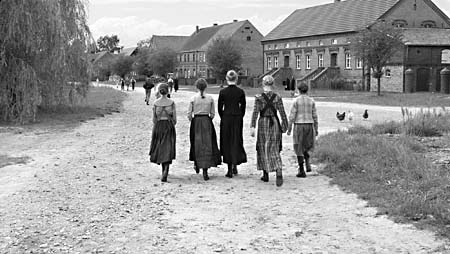WHITE RIBBON, THE (DAS WEISSE BAND)
(director/writer: Michael Haneke; cinematographer: Christian Berger; editor: Monika Willi; cast: Ulrich Tukur (the Baron), Susanne Lothar (the Midwife), Christian Friedel (the Schoolteacher), Burghart Klaussner (the Pastor), Leonie Benesch (Eva), Josef Bierbichler (the Steward), Rainer Bock (the Doctor), Ernst Jacobi (the Narrator), Ursina Lardi (Marie-Louise, the Baroness), Fion Mutert (Sigmund), Branko Samarovski (the Farmer), Leonard Proxauf (Martin), Maria- Victoria Dragus (Klara), Michael Kranz (the Tutor), Fion Mutert(Sigi), Josef Bierbichler (The Steward), Eddy Grahl (Karli); Runtime: 144; MPAA Rating: R; producers: Stefan Arndt/Veit Heiduschka/Margaret Menegoz/Andrea Occhipinti; Sony Pictures Classics; 2009-Germany-in German with English subtitles)
“Disturbing and provocative shocker.“
Reviewed by Dennis Schwartz
Austrian writer-director Michael Haneke (“Funny Games”/”Code Unknown”/”The Piano Teacher”) creates an opaque yet accessible murder mystery story told in a fine detailed way about German repression and hidden fascist’s roots and how the evil seeds of the parents (bad parenting that includes sexual abuse, no open communication and corporal punishment) are passed down to their children which makes them susceptible to later Nazi influences. It’s shot in a luminous black-and-white. The White Ribbon (the title derived from a white ribbon worn by the pastor’s troubled daughter Klara–Maria- Victoria Dragus– to remind her of purity) is a disturbing and provocative shocker that reminded me of a Kafka novel or the 1976 evil-kid pic “Who Can Kill A Child?”
It won at Cannes the Palme d’Or.
Haneke sets it in a rural feudal Protestant village in northern Germany during 1913-1914, on the brink of World War I. It’s told in flashback by an elderly teacher’s voice (Ernst Jacobi), who at the time of the story (probably some 40 years earlier) was an innocent 31-year-old teacher (Christian Friedel) courting the 17-year-old innocent nanny Eva (Leonie Benesch). She was just hired to take care of the baron’s (Ulrich Tukur) twins and lived on his estate.
It tells of several strange accidents that occur in the village that are never solved, that starts with the unhappy widowed doctor (Rainer Bock) hospitalized for a broken collarbone after his horse trips over a hidden wire laid over his path home, followed months later by the suspicious accidental death of a tenant farmer’s wife falling through the rotted floor of the baron’s mill, the kidnap torturing of the unpopular but respected baron’s young child (Fion Mutert), animals killed by torture and the blinding of the gentle retarded Karli (Eddy Grahl)–the son of the midwife (Susanne Lothar). It’s strongly hinted that the uptight stern pastor’s (Burghart Klaussner) children and the child members of the choir might be responsible for these incidents, but it’s never proven and the pastor vehemently refuses to believe that. At the onset of World War I, just as Archduke Ferdinand of Austria has been assassinated in Sarajevo, the investigation is halted by the police as the village turns its complete attention to the war. The story’s would-be hero and narrator, the sensitive teacher, is drafted and after the war he never returns to the village again and never sees anyone in the story again except for Eva. She became his wife and he became a tailor.
Haneke asks us to consider that these terrible incidents were a harbinger of the rise of Nazism in Germany, for a population that was too numb to its chilling upbringing to find love in their hearts for others. We are left at both the beginning and ending of this haunting period film images of an idyllic pastoral setting, but for most of the film we witness class division and unpleasant authority figures pushing their weight around on others who are in lower positions. There’s no one person to blame, but an entire culture for its poor child-rearing and bankrupt church and twisted sense of morality.

REVIEWED ON 3/24/2010 GRADE: B+